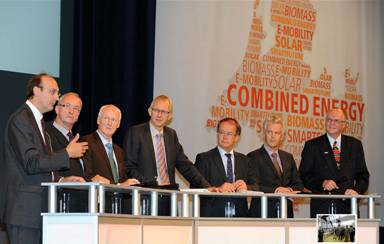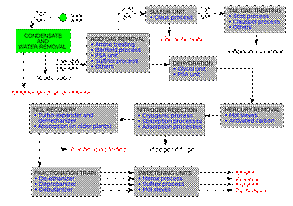
|
|
 |
|
|---|
Many modern and innovative companies have already recognized this growth potential.
The great potential of energy systems, including ecology, economics and social responsibility as well as science and business can be used together. Leadership in the field of electric vehicles, the storage of wind power technology research and further should be extended, show how to tackle climate change and thus succeed in making it socially acceptable. " |
Energy is at the top of of the political and economical agenda. According to the policy proposal 'Towards a European Energy Community' by Jacques Delor, Europe has lost its ability to pursue a truly common policy covering the three objectives that are essential to energy policy today: affordable access to energy; sustainable development of energy production, transport and consumption; and security of supply (gas architecture policy brief from Clingendael, securing European natural gas supplies from CEPS, and Energy Supply in a
World of High Demand from The Aspen Institute, Energy and Environment Program). A comprehensive guide can be find in the WorldWatch report.
Europe needs a common energy policy in order to guarantee for its citizens to energy at reasonable and stable prices; to maintain its industrial competitiveness; to promote sustainable development and, due to climate, the transition to a low-carbon society; and to ensure security of energy suply for all Europeans. Energy is indispensible to all human or industrial activity. Demand is inelastic and supply often requires very large investments. Moreover, energy is increasingly being transported and transmitted via networks. The construction and operation of these grids raise technical, financial and regulatory issues. And finally, energy sources and energy technologies change over time. A common energy policy should therefore be flexible, to accomodate changing conditions. In doing so, the European Commission is working on these goals through an energy strategy for Europe. Moreover, and under the pilot project "Transatlantic Methods for Handling Global Challenges in the European Union and the United States", the project "Atlantic Energy Efficiency Project" is running with the objectives to develop mutual understanding about plans and performance in regard to energy efficiency in Europe and the US, the opportunities for mutual learning and shared initiatives, relate the insights to global developments, in particular in regard to developments in China, India and Japan. In April 2013, during the 4th Brussels Think Tank Dialogue's session 'Energy Internal Market: State of the Art and Challenges Ahead, the post-2020 objectives were discussed and in particular their results that will shape the energy sector for the next 20 years. What is the state of the art of the European energy market? How about the ETS, power and gas systems? Key trends and challenges characterize each market, but their linkages are becoming greater. What coherent answer can Europe offer in response? The Dialogue provided the conference paper 'The State of the Internal Energy Market', which highlight some of the key challenges and policy recommendations for the EU internal energy market, focussing on three separate – yet intertwined – issues: the EU electricity market, the EU gas market and the EU Emissions Trading System. |
|
|
EnergyAgency.NRW performed ‘Future Energy’ on 7 February 2012 at the trade fair E-world energy & water through lectures on trends, markets and new developments in energy technology. Five parallel forum topics were treated:
- wind energy; Together with the Netherlands, NRW also held in September 2012 the 1st Netherlands-North Rhine-Westphalia Combined Energy Conference with the aim to have a first exchange of each others experiences in the field of energy savings and transition and to facilitate future contacts. During the plenary session and workshops far reaching components of the energy-agenda were extensively discussed. The Minister for Climate Protection and Innovation of North Rhine Westphalia and the Secretary General of the Dutch Ministry of Economic Affairs put the keynotes for discussions to follow on:
|

|
There are still many barriers concerning rural integrated cross-border solutions. Much has been achieved but much more needs to be achieved. You must, however sit deep in the tactical and operational field to do immediately something with the presented knowledge, but it was a succes looking at the total field and to overlook the energy-agenda. |
To learn more about CHP technology and the significant opportunity for expansion, browse the website combined heat and power (CHP) and power plants in the futureabout Micro CHP - decentralized energy supply for the future. A pioneering product innovation see it especially in the efficient fuel cell technology. "The question is not if but when the fuel cell technology in the domestic energy sector is competitive."
The Forum of bioenergy research, for example noticed a sink for waste heat and CO2," not only solutions for the energy and climate change were presented, but also skills in the areas of electric vehicles, energy-efficient construction and housing, energy networks and storage, bio-energy, combined heat and power and power plants in the future as well as wind energy. The fossil fuel natural gas is a naturally occurring hydrocarbon gas mixture consisting primarily of methane, with other hydrocarbons, carbon dioxide, nitrogen and hydrogen sulfide. Natural gas is an important energy source to provide heating and electricity. It is also used as fuel for vehicles and as a chemical feedstock in the manufacture of plastics and other commercially important organic chemicals. |  |